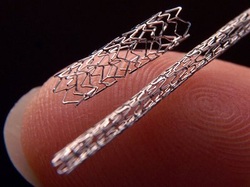 The debate over whether patients with 3 vessel coronary artery disease should be treated with multi-vessel stenting (PCI) or coronary bypass surgery (CABG) has raged for the last decade. Stenting only needed to be as good as surgery for it to become the treatment of choice since the procedure is less invasive and the recovery time quicker. Comparison of the two forms of treatment has been difficult because stents have been constantly improved meaning that every trial was out of date compared to currently available technology at the time the results were published. This week the final 5 year results of the SYNTAX trial were published in the Lancet. This trial randomised 1800 patients to stents or surgery. The average age of the patients was 65 years, 75% were men and 25% diabetic. The combined end point included all-cause mortality, stroke, myocardial infarction and repeat revascularisation. The results showed that 26·9% in the CABG group and 37·3% in the PCI group reached that endpoint (p<0·0001). Myocardial infarction was higher in the PCI group (9.7% vs 3·8%; p<0·0001), as was the need for repeat revascularisation (25·9% vs 13.7%; p<0·0001). All-cause death and stroke were not different. So what can we learn from this trial. First the CABG group appear to get continued benefit as time went on. One explanation for this is that since CABG bypasses, any disease progressing in the artery proximal to the insertion point of the bypass graft remains treated which is not the case if a stent has been implanted. This may not be the whole explanation since CABG did not show a benefit over PCI in the left main stem treatment group although there were only 222 patients in this group. Second, SYNTAX acknowledged that not all 3 vessel disease is the same with some patients have discrete, simple lesions and others having very complex disease. Embedded in this trial was a scoring system (www.syntaxscore.com) which allowed a measure of the severity of the coronary artery disease. Treatment of low score (22 or less) or an isolated left main stem stenosis with CABG did not appear to confer an advantage over stents. In contrast an intermediate or high SYNTAX score predicted a significantly worse outcome if treated with stents rather than CABG. The results indicate that patients with simple three vessel disease could reasonably be treated with stents rather than surgery although it is important to remember that the analysis of subgroups in clinical trials is only hypothesis generating. The subgroups do not have enough patients in them to be adequately powered to draw definitive conclusions. Calculation of the SYNTAX Score gives the cardiologist an estimate of the severity of disease and helps feed into the decision making process regarding the best means of revascularisation. The other issue is that of patient choice. More patients randomised to CABG withdrew from the trial compared to PCI. Faced with a decision regarding what treatment to have the patient will have views and these need to be informed by a discussion of the best available evidence. If a patient understands that stents may have a less good outcome they may still decide to have this treatment because it is less invasive than CABG. The SYNTAX trial also leaves open the question of how to manage much older patients where the risk of stroke and mortality is greater. Many patients we currently see are in their late 70s or 80s, often with severe coronary disease and they may be less included to undergo CABG. Also most of the participants in SYNTAX were male and therefore it is difficult to know whether the outcomes for women would be the same. The SYNTAX trial is an important landmark to inform how we should manage severe coronary artery disease. However we need to remember that as cardiologists we treat individual people and the results of the clinical trials present results from pooled groups of patients may not always be representative of the patient in front of us. Coronary artery bypass graft surgery versus percutaneous coronary intervention in patients with three-vessel disease and left main coronary disease: 5-year follow-up of the randomised, clinical SYNTAX trial
0 Comments
Your comment will be posted after it is approved.
Leave a Reply. |
Dr Richard BogleThe opinions expressed in this blog are strictly those of the author and should not be construed as the opinion or policy of my employers nor recommendations for your care or anyone else's. Always seek professional guidance instead. Archives
August 2023
Categories
All
|
 RSS Feed
RSS Feed

